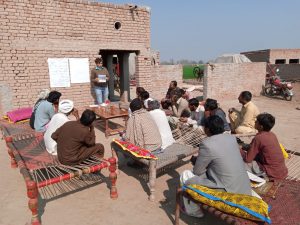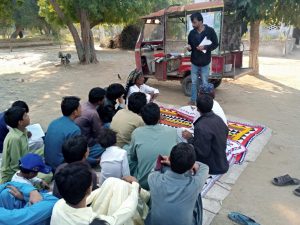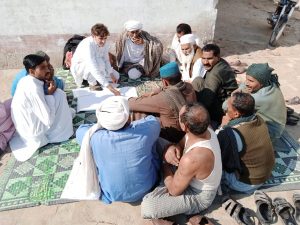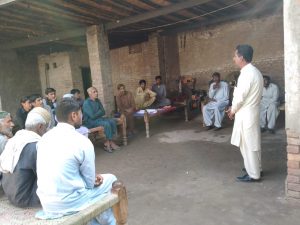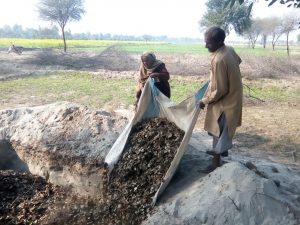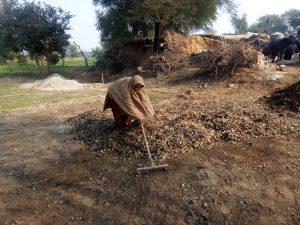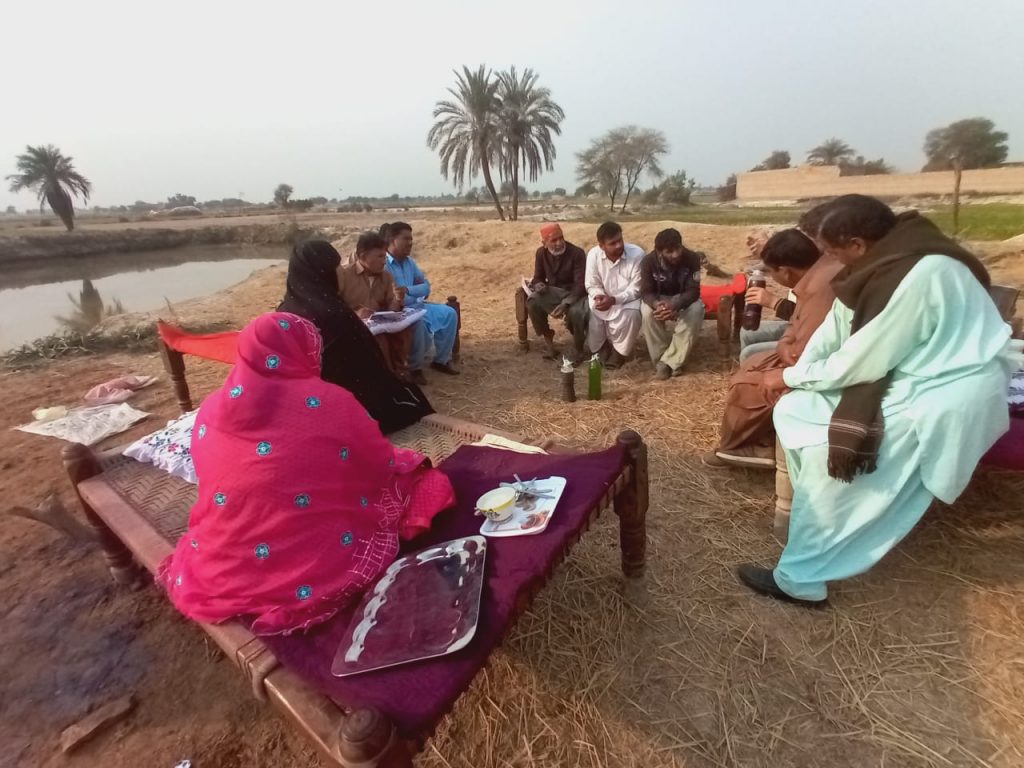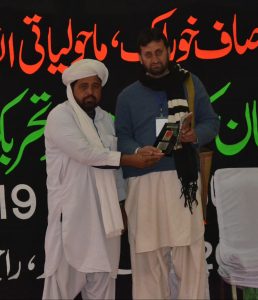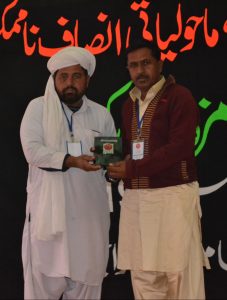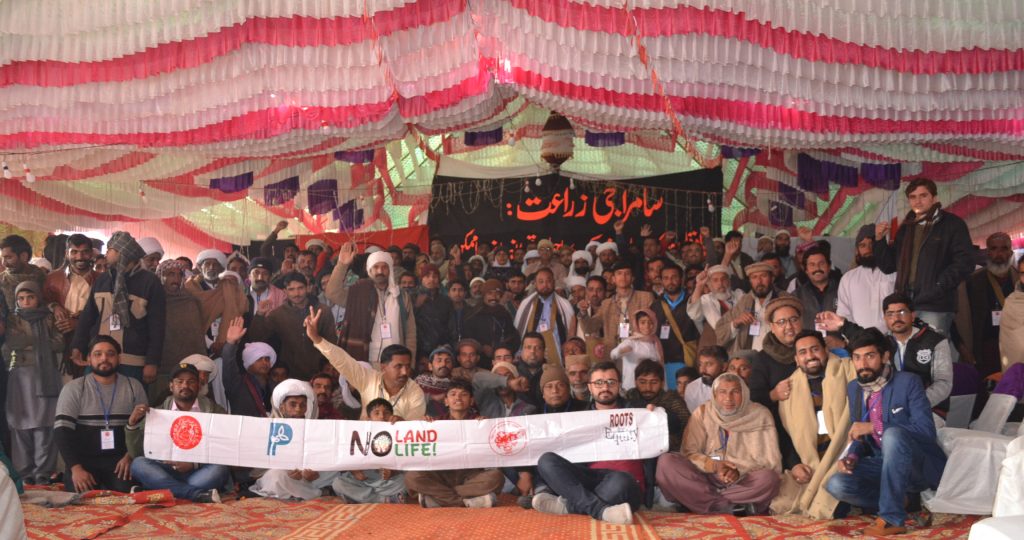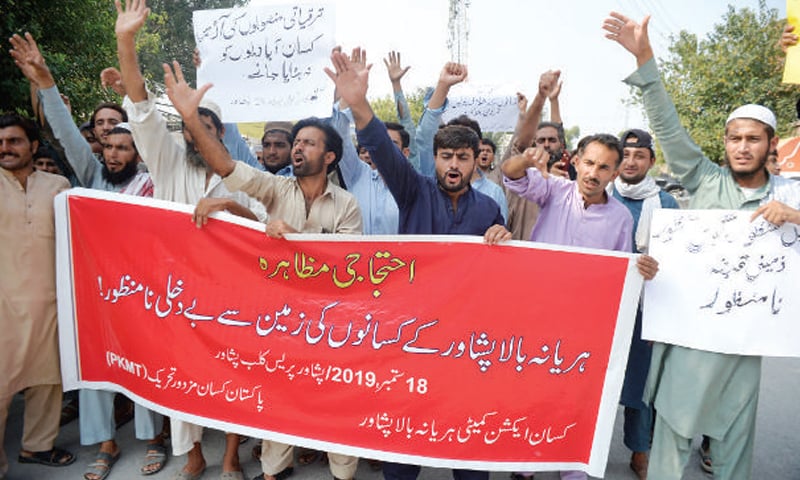Pakistan Kissan Mazdoor Tehreek (PKMT) organized Sustainable Agriculture Orientation SAO’s in different villages of a district Ghotki, Khairpur in Sindh, Rajanpur, Multan and Sahiwal in Punjab and Mansehra in KP. The aim of the sessions was to realize the difference between the lives of farmers before and after the adaptation of green revolution and to analyze the importance of sustainable agriculture.
Category Archives: Farmer
Preparation of Green Compost at the lands of women Farmers in Punjab and Sindh
Under the base of PKMT Jazba farmers cooperative there are four Agro ecological farms which tend by women. A woman’s presence led farms are entirely new experience and will be a model for rural women empowerment. Farmers are having meetings and preparing green compost for their crops.
Interviews from the farmers of PKMT Farmers Cooperative Jazba
Under PKMT Farmers’ Cooperative Jazba there are 12 agroecological farms in three provinces, Sindh, KPK and Punjab. Each farm is on one acre of land. Six farms are in Sindh, four farms are in KPK and two are in Punjab. Out of these twelve farms, women farmers manage four.
During our visits to the Jazba farms we carried out interviews with different farmers. The farmers provided details on preparation of land and the varieties of traditional seeds they have sown. They also described green compost preparation that they are carrying out on their land so that will be applied on their land. The farmers were also preparing the natural pesticide, which they will use if needed.
- BakhtiarZeb, farmer from Lower Dir said that he has been part of PKMT since 2011. He said that our ancestors did not use chemical pesticides such as DAP and urea but we have used it and face the harmful effect on the crops. Our father had also advised us and stopped us from using chemical inputs as it carries disease. Now as we realize it, we have also gone back to sustainable agriculture.
To prepare natural fertilizer (green compost) we have put rotten vegetables as well as peel from vegetables collected from our home use and animal manure. It will be ready in two months, but will look open the pit again after 10 to 15 days. Bakhtiar said that “I believe in natural traditional farming and have practiced it from a long time.”
He has willingly contributed one acre of his land toward the Jazba cooperative. In his one acre of land he has sown two kinds of traditional seeds, namely, Haripur white wheat (which was obtained from a farmer in Haripur about 9-10 years ago) and Ratti (which is a red colored seed indigenous to Dera Ismail Khan, Punjab). He added that he is also making natural spray for pesticides from urine of cow as an experiment.
- The Farmer from district Shikarpur, Ali Gul Solongi, said that he is member of PKMT. He had sowed three varieties of wheat seed in his one acre of land. He had used 25 kg of a traditional seed from Mansehra, Khyber Pakhtunkwa, 25 kg of seed from Rajanpur, Punjab and 15 kg of Galaxy seed form Sindh. The last is not a traditional seed but has been used over and over again for the past four years. It is being sown for the fifth time with in PKMT farms. He has added the third variety as he feels that 25 kg of seed may be less for the acreage on which it is being used.
According to him, he has turned to sustainable way of cultivation so that he can grow healthy seed. He feels that production may be low, but it will be healthy. Secondly, expenses will be reduced and yield pure seed. Ali Gul added that we will be able to eat this grain, save it as well distribute it to other farmers. His message was “Desi beech ugao . . . companeo ko bhagao” (sow traditional seeds and drive out companies).
Upscaling and Strengthening Agro ecology:
Pakistan Kissan Mazdoor Tehreek (PKMT) has established a Farmers Cooperative and named it Jazba. Jazba has enlisted various farmers to further agro ecology-based farms in seven districts spread over three provinces of Pakistan with the collaboration between various actors, that include mass-based farmers’ organizations, non-government organizations, academia and consumer groups.
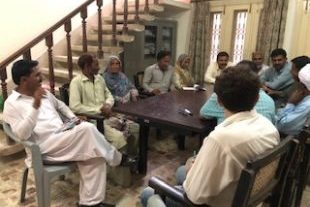 Jazba aims to upscale and strengthen agro ecology and to build technical and social alliance between various actors such as farmers movements, trade unions, women’s groups, scientists and consumers to advocate for agro ecology and food sovereignty and to bring out the strength of agroecology as a science, as a movement and as a practice, especially in face of corporate hegemony, which is detrimental to farmers self-sufficiency, health and environment.
Jazba aims to upscale and strengthen agro ecology and to build technical and social alliance between various actors such as farmers movements, trade unions, women’s groups, scientists and consumers to advocate for agro ecology and food sovereignty and to bring out the strength of agroecology as a science, as a movement and as a practice, especially in face of corporate hegemony, which is detrimental to farmers self-sufficiency, health and environment.
No doubt the collaboration is more of a political response to the threats being faced by society at large, but most importantly the marginalized especially landless and small farmers, women farmers and general public.The collaboration is also helping in linking farmers with consumer markets as well.
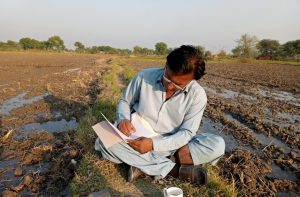 A foundation stone of Jazba is to promote safe, nutritious and healthy food for all. The extensive use of chemicals in corporate farming based on use of hybrid and genetically modified seeds, toxic pesticides and chemical fertilizers has severely impacted the health of all living things as well has been a cause for massive destruction of biodiversity.
A foundation stone of Jazba is to promote safe, nutritious and healthy food for all. The extensive use of chemicals in corporate farming based on use of hybrid and genetically modified seeds, toxic pesticides and chemical fertilizers has severely impacted the health of all living things as well has been a cause for massive destruction of biodiversity.
Of the 12 agro ecological farms, six are in Sindh,two in Punjab and four in Khyber Pakhtunkhwa.
Every farm consists of one acre of land. Four of the 12 agro ecology farm, four are managed by women. Presence of women-led farms is an entirely new experience and will be a model for rural women’s empowerment.
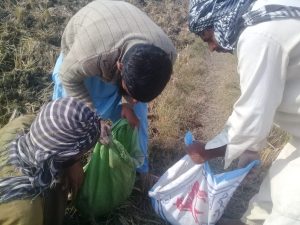 Each farmer has only used natural fertilizers from animal dung and green compost. Six farmers have already initiated making compost on the land; the other five are preparing land but has been postponed due to rains in December 2019 and January 2020. Formal initiation of the 12 farms was initiated with wheat sowing season.An initial training for preparing biological pesticides was given early in the project.
Each farmer has only used natural fertilizers from animal dung and green compost. Six farmers have already initiated making compost on the land; the other five are preparing land but has been postponed due to rains in December 2019 and January 2020. Formal initiation of the 12 farms was initiated with wheat sowing season.An initial training for preparing biological pesticides was given early in the project.
PKMT and its partners will launch a campaign to create greater awareness of agro ecological practices, its economic and social benefits and to motivate other farmers and groups to engage in agroecology.
“Corporate Agriculture: Decent Livelihood, Pure Nutritious Food and Environmental Justice Impossible!” (PKMT) 12th Annual Assembly
Pakistan Kissan Mazdoor Tehreek (PKMT) held its 12th Annual Conference 28, December, 2019 in Jampur, Rajanpur. The theme of the conference was “Corporate Agriculture: Decent Livelihood, Pure Nutritious Food and Environmental Justice Impossible!”
The Annual conference started with the registration of the members from various districts of the country.
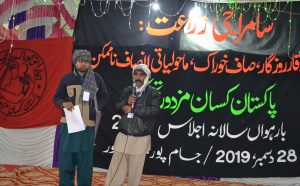 The 12th PKMT General Assembly was kicked off with welcome remarks from the Punjab provincial coordinator Maqsood Ahmed, Rajanpur district coordinator Abdul Ghafaar. A one minute silence was observed in memory of Ghulam Yaseen, PKMT member who had passed away earlier this year.
The 12th PKMT General Assembly was kicked off with welcome remarks from the Punjab provincial coordinator Maqsood Ahmed, Rajanpur district coordinator Abdul Ghafaar. A one minute silence was observed in memory of Ghulam Yaseen, PKMT member who had passed away earlier this year.
The program began with a theatre performance from the PKMT group “PUKKUK”.
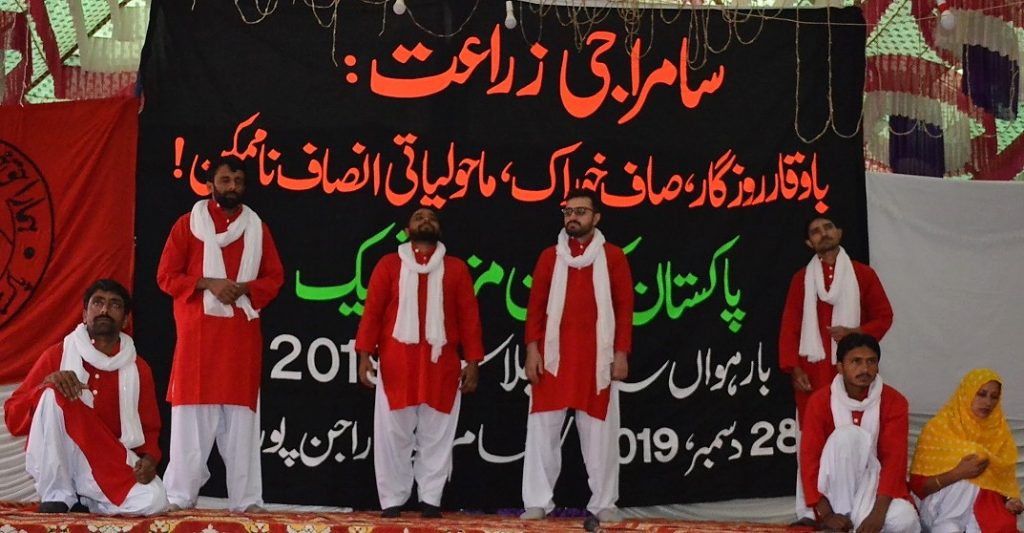 Key Notes were delivered by Azra Talat Sayeed, followed by two different sessions focusing on the debacle of corporate agriculture, its impacts on farmers’ livelihood, climate crisis and decreasing access to safe nutritious food. Guest speaker was a trade unionist Mr Junaid Awan, Railway Workers Union.
Key Notes were delivered by Azra Talat Sayeed, followed by two different sessions focusing on the debacle of corporate agriculture, its impacts on farmers’ livelihood, climate crisis and decreasing access to safe nutritious food. Guest speaker was a trade unionist Mr Junaid Awan, Railway Workers Union.
Khyber Pakhtunkhwa provincial coordinator Mr Fayaz Ahmed provided a detailed run down on PKMT’s activities for 2019.
An award giving ceremony was conducted for farmers practicing Sustainable Agriculture. The two farmers who received the PKMT PaidarZarat Award were Mr Bakhtayar Zeb, Lower Dir, Khyber Pakhtunkhwa, and Mr Ali Gohar, Gohar, Sindh. Both were chosen for receiving the award based on a criteria set by the PKMT National Seed Committee.
A session by the name of “Bol K Lab Azad Hain Tere” provided space for issues raised by famers across the country.
A vote of thanks was delivered by the Sindh provincial coordinator followed by the PKMT tarana sung by the members.
Hunger Perpetuates Profit for TNCs!
Press Release:
World Hunger Day, October 16, 2019
The United Nation’s Food and Agricultural Organization (FAO) is celebrating the World Food Day on October 16, 2019 as “Healthy Diets for a Zero Hunger World.” It is unfortunate that it seems to have slipped FAO’s notice that the very people who produce food for the whole world are facing hunger and are very far from ‘healthy diets; and so more appropriately have marked this day as the “ World Hunger Day” to protest their grim, hunger-drivenreality. This is a dark fact faced by millions of households around the world especially in the third world countries, particularly in the rural areas. It is in this context that the Asian Peasant Coalition (APC) and its members since 2012, has marked October 16 as the World Hunger Day. Pakistan Kissan Mazdoor Tehreek (PKMT) and Roots for Equity joined hand with APC in marking World Hunger Day and organized a Peasant Assembly and staged a demonstration in Khairpur, Sindh on October, 16, 2019.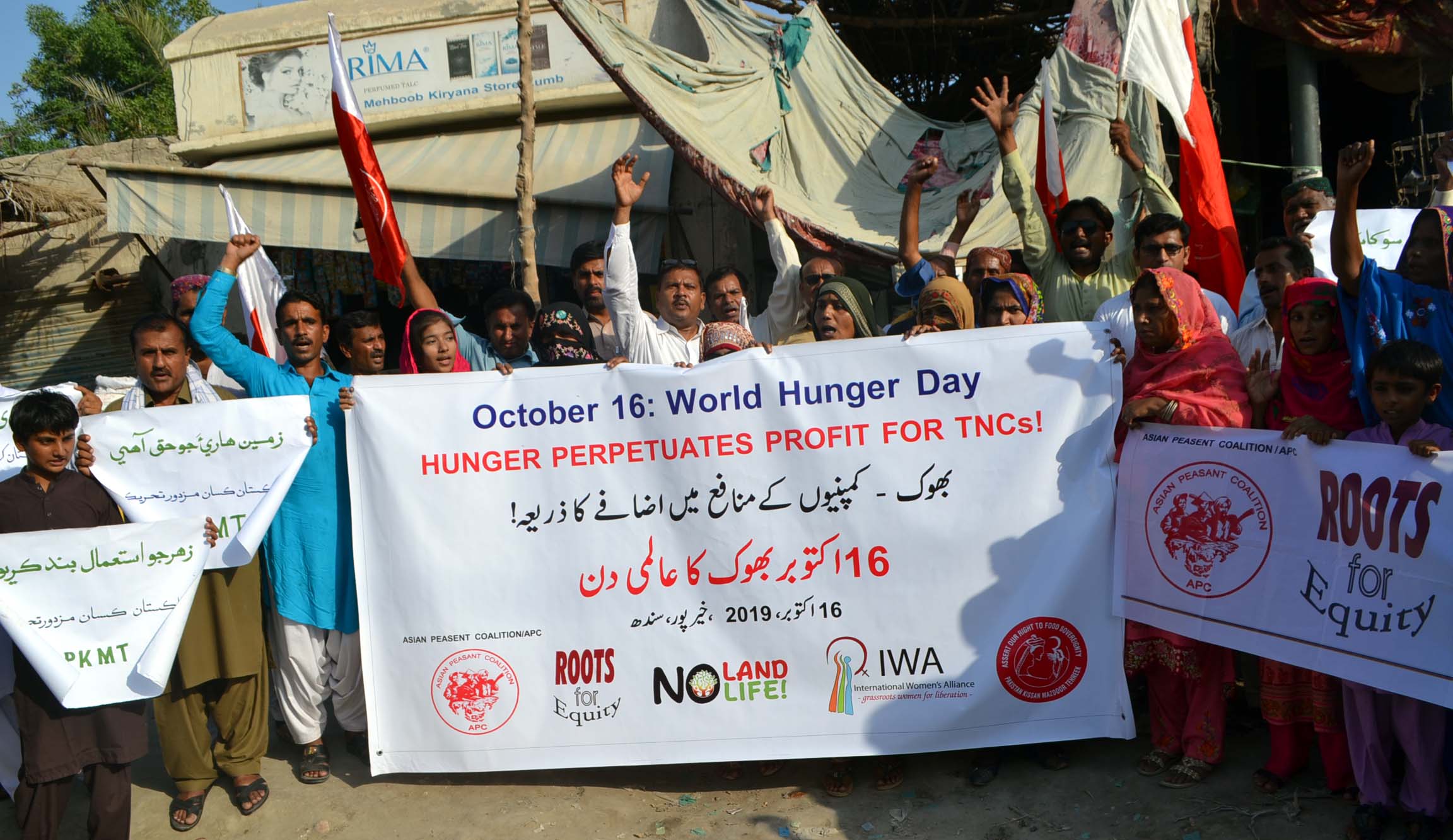 According to the FAO 2019 the State of Food Security and Nutrition in the World more than 820 million people in the world are still hungry today. And even worse, more than 2 billion people do not have access to safe, nutritious and sufficient food. It need not be said that in every continent women suffer more than men from food insecurity. Nearly half a billion hungry people live in Asia, of which a majority are in South Asian countries; it is in South Asia that prevalence of undernourishment at 15% remains the highest. In Pakistan, the Global Hunger Index 2018 ranks Pakistan at 106 out of 119. According to World Food Program (WFP), 60 percent of the population still faces food insecurity, 15 percent of under-five years of age children suffer from acute malnutrition, which is considered to be the second highest rate in the region. Close to 44 percent of children in the same age group are stunted, 32 percent are underweight.
According to the FAO 2019 the State of Food Security and Nutrition in the World more than 820 million people in the world are still hungry today. And even worse, more than 2 billion people do not have access to safe, nutritious and sufficient food. It need not be said that in every continent women suffer more than men from food insecurity. Nearly half a billion hungry people live in Asia, of which a majority are in South Asian countries; it is in South Asia that prevalence of undernourishment at 15% remains the highest. In Pakistan, the Global Hunger Index 2018 ranks Pakistan at 106 out of 119. According to World Food Program (WFP), 60 percent of the population still faces food insecurity, 15 percent of under-five years of age children suffer from acute malnutrition, which is considered to be the second highest rate in the region. Close to 44 percent of children in the same age group are stunted, 32 percent are underweight.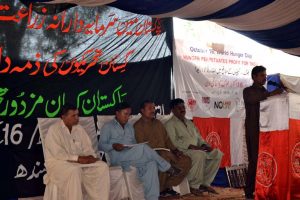
Hunger today is less about the lack of food and more due to the structural issues embedded in the production system. Vast inequalities stem from the fact that concentration of land in the hands of feudal and big landlords remains while a very big majority remains landlessness. According to the World Bank only 2% of the farm household control 45%, while the remaining 98% control only 55% of total agricultural land in Pakistan. At one hand the rural communities, especially the landless farmers are highly dependent on natural resources for their livelihood and on the other hand the neoliberal framework has accelerated the commoditization of nature which include seed, water and other productive resources, with a massive attack on community rights to natural resources, large-scale exploitation and destruction of biodiversity for TNCs unending unhealthy appetite for profits.
Climate crisis -driven by transnational corporations unsustainable fossil fuel-based industrial production and unrelenting exploitation of natural resource- has devastated for rural communities of Pakistan particularly small and landless farmers. The severe heat wave and untimely rains and storm have consistently resulted in massive crop loss and irregular production across the country. Farmers across the country are reporting loss in harvest; for example tomato crop in Khyber Pakhtunkwa, maize in Punjab, rice and cotton in Sindh have all suffered, and farmers are facing a huge financial crisis and with no remedy being discussed by the government. Farmers also report that imported hybrid rice seed by many multinational companies are even not giving production, which has been used to plant nearly 75% area under rice cultivation in Sindh.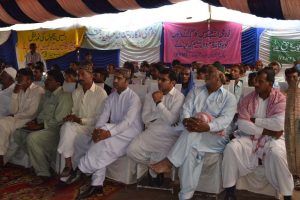
Thousands of agricultural labor particularly landless women who are the main sector responsible for harvesting rice and cotton have lost a very important part of meager income as harvest in these two crops has gone down drastically. There is now further migration of rural communities flooding cities living in inhumane conditions; there is no doubt that the further impoverishment of a very vulnerable marginalized sector is at the hands of these mega-seeds corporations.
The immense control over agriculture and food production in the hands of the grotesque transnational agro chemical companies is the most critical major reason for rising hunger not only in Pakistan, but Asia and globally.
As an immediate measure it is imperative that the government must compensate farmers suffering from climate crisis and industrial agricultural practices. At the same time it is of course clear that dismantling monopoly control over food, land and market by capitalist corporations is the only feasible response to overcoming rising hunger and malnutrition in our country and the world over. The response of course has to be upholding food sovereignty, which is based in just and equitable distribution of land. The right to development of people and communities everywhere is based in implement genuine agrarian reform; and promote agro ecological systems as the sustainable and healthier systems of food production based on agro-ecological principles.
PKMT leaders, Ali Nawaz Jalbani, Pathani, Ghulam Jafar, Raja Mujeeb, Hakim Gul, Mohammad Sharif, Ali Gul, Noor Ahmed, Mohammad Azim, Wali Haider, and others were Spoken to the assembly.
Released by: Pakistan Kissan Mazdoor Tehreek (PKMT) and Roots for Equity
‘Rural Women Backbone of Agriculture Sector’
Press Release
15 October 2019
Roots for Equity and Pakistan Kissan Mazdoor Tehreek (PKMT) celebrated the Rural Women’s Day along with Pesticide Action Network, Asia Pacific (PANAP), International Women Alliance (IWA), Asian Peasant Coalition (APC) and other people’s organizations.
PKMT organized a Conference at Kamilpur Village of district Haripur in Khyber Pakhtunkhawa, Pakistan. At the rally, Rida Batool a PKMT member stated that rural women are the back bone of overall agriculture system playing critical role in cultivating and harvesting crops and vegetables, breeding as well as breeding and taking care of livestock. But even with their back breaking contribution in food and agriculture production, women are not considered farmers given the deeply embedded patriarchal system.
According to Nazia, a landless farmer, women participate widely in cotton picking, sugar cane harvest, as well as vegetable picking but in return they have very meager wages, as low as Rs 200 to 300 rupees per day for long working days of 8-10 hours. This is all done in under extremely oppressive work conditions, either very high temperatures, or in mild to very cold temperatures.
Khalid Mahmood, PKMT District Coordinator Haripur emphasized that agro-chemical agriculture production is ridden with chemical fertilizers and pesticides, which impact women’s health. Poison laden hybrid seeds and heavy pesticide spray force women to be exposed to these toxins, and they suffer from many forms of allergies, as well as respiratory diseases.
Fiaz Ahmad, Provincial Coordinator Khyber Pakhtunkwa stated that the unsustainable production system and exploitation of natural resources under capitalism is the paramount thrust behind climate change. Climate crisis and disasters have devastated the lives of small and landless farmers especially rural women. Constant floods, unseasonal rains, hailstorms all have impacted harvests, creating acute food shortages. The vast production of sugar cane as an agro-fuel has further exacerbated women’s suffering as they are forced to harvest sugar cane and are not given any wages; instead, they are given the green fodder from sugar cane which they are forced to accept as they have no land to grow fodder for their livestock.
This is the reason that today 60 percent of country’s population is suffering from food insecurity. According to national nutrition survey 2018, 41.7 percent of women in Pakistan aged 15 to 49 are suffering from anemia. In rural areas the rate of anemia is 44.3 percent, however, 79.7 percent of women are vitamin D deficient.
In this Rural Women Day Pakistan Kissan Mazdoor Tehreek (PKMT) demand for just, equable distribution of land among small and landless men and women farmers. PKMT also demands that all decision-making with respect to agriculture and food production must be in the hands of small producers, including small farmers, fisherfolk, and other marginalized communities. PKMT believes that food sovereignty could be the only feasible way forward for attaining self-sufficiency in food and agriculture, eradicating hunger and malnutrition and eradicating poverty.
Released by Pakistan Kissan Mazdoor Tehreek / PKMT
https://www.dawn.com/news/1511023
Farmers hold demo against eviction
PESHAWAR: Farmers belonging to different villages of Peshawar held a protest demonstration in front of the Peshawar Press Club against eviction from their land being acquired for construction of the Northern Bypass.
The demonstration was jointly arranged by Kissan Action Committee, Haryana Bala, and Pakistan Kissan Mazdoor Tehreek wherein farmers belonging to Garhi Bajaz, Choli Bala, Choli Payan, Mathra, Garhi Wali Mohammad and other affected localities participated.
The protesters told media persons that the farmers’ families possessed the land for the last 80 years which was their only source of livelihood. The farmers claimed that the government was taking possession of the land for construction of Northern Bypass without paying its price to the owners.
“The government is not only snatching our livelihood but also depriving us of our homes which we have built with our meager resources,” they said.
The Northern Bypass project has affected many villages, they said and claimed that the farmers in these areas had been threatened to leave the land or they would be forcefully evicted. They alleged that the compensation of agriculture land and houses had been given to an influential person.
“We have approached various government offices and officials to seek help, but to no avail,” they said and added that the land property was common (shamilat) which had been converted into cultivatable land by their forefathers.
They alleged that MNA Noor Alam Khan was supporting the influential landowner while rest of the farmers had been ignored. “False FIRs have been lodged against some farmers to pressurise them,” they said.
The Kissan Action Committee, Haryana Bala, and Pakistan Kissan Mazdoor Tehreek have demanded of the government to release all the arrested farmers and withdraw the FIRs.
They urged the government to provide alternative land for housing and payment of the construction cost in lieu of the houses being demolished for the project. The farmers were holding banners and placards inscribed with slogans against what they called their forced eviction.
Published in Dawn, September 19th, 2019
https://www.dawn.com/news/1505965/farmers-hold-demo-against-eviction
No to Peasants’ Eviction from Haryana Bala, Peshawar
Press Release
September 18, 2019
Kissan Action Committee Haryana Bala, Peshawar held a protest demonstration in front of the Peshawar Press Club against their eviction from their land due to the construction of the Northern Bypass. The landless farmers have been working on this land for the last 80 years, having been the first to domesticate the land making it ready for cultivation. The farmers stated that they were not only losing their livelihood but their homes, which they had built based on their labor and meager earnings. The Northern Bypass project has affected many areas, which, include Garhi Bajaz, Choli Bala, Choli Payan, Mitra, Garhi Wali Mohammad, and farmers in these areas are being threatened that they should leave or will be forcefully evicted. The compensation of agriculture land and houses has been given to big landlords with political influence, which further exacerbated the peasants’ livelihood and miseries.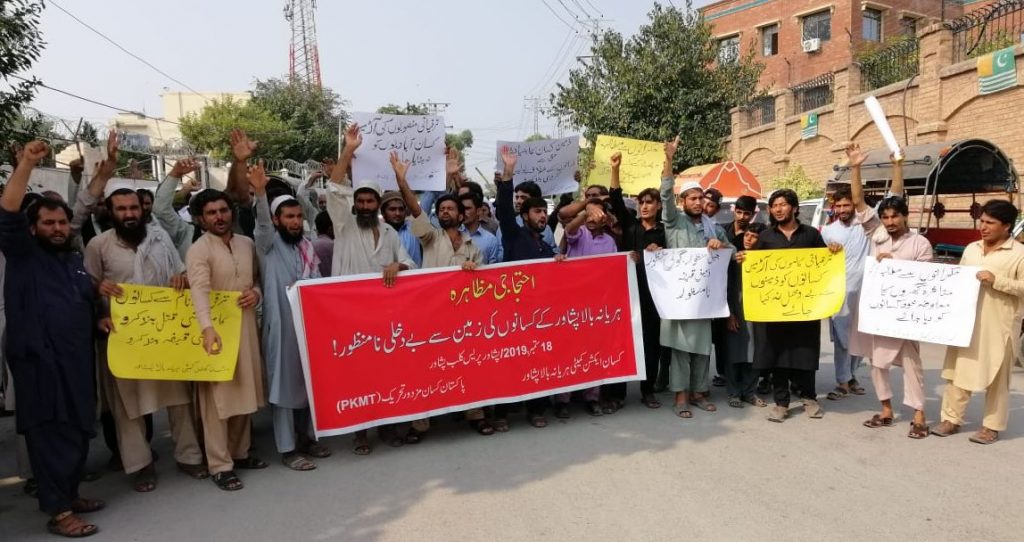
The peasants stated, “ we approached various government offices and officials to seek help in this regards but no help has been provided.” According to the sources, majority of these land are common lands (shamlat) which has been converted into cultivatable land by their forefathers, and some of the land is owned by landlord Sher Alam Khan. The government has provided compensation that has been appropriated by Sher Alam Khan, even though it has been meant for the peasants. Sher Alam Khan is being backed by a local MNA, Noor Alam Khan. This is the basic reason that voices of the peasant are not been heard. False FIRs have been lodged against some farmers and some have been arrested to pressurize and silence the peasants.
Land grabbing through mega projects such as dams, highways, motorways, special economic zones and others are now a common ‘development’ strategy in many of the third world countries, all at the cost of the most marginalized communities. The government and other policymaking entities ignore the immensely negative impact of such mega-projects on local people livelihood, environment and their way of living.
The Northern Bypass project is to accelerate free trade between Pakistan and Afghanistan. According to sources this project will connect with Khyber Bypass Economic Corridor (KPEC) for which the World Bank has provided loans; the KPEC was approved in June, 2018.
Kissan Action Committee Haryana Bala and Pakistan Kissan Mazdoor Tehreek (PKMT) demands to the Government and related institutions are:
- All arrested related to the case must be released immediately and withdraw all false FIRs;
- Provide alternate space for housing and construction cost in lieu of the houses demolished or to be demolished;
- Provide alternate land for agriculture purpose for those evicted or to be evicted;
- Stop land grabbing through development projects and special economic zones;
- Distribution of land on just and equitable basis;
Released by: Kissan Action Committee Haryana Bala, Peshawar and Pakistan Kissan Mazdoor Tehreek (PKMT)
No to Indian Occupation of Jammu and Kashmir
Press Release
August 15, 2019
Pakistan Kissan Mazdoor Tehreek, Sojhla for Social Change, Roots for Equity and other civil society groups held a protest to mark India’s Day of Independence as a Black Day to show their solidarity with the people of Indian Occupied Kashmir, in front of the Multan Press Club.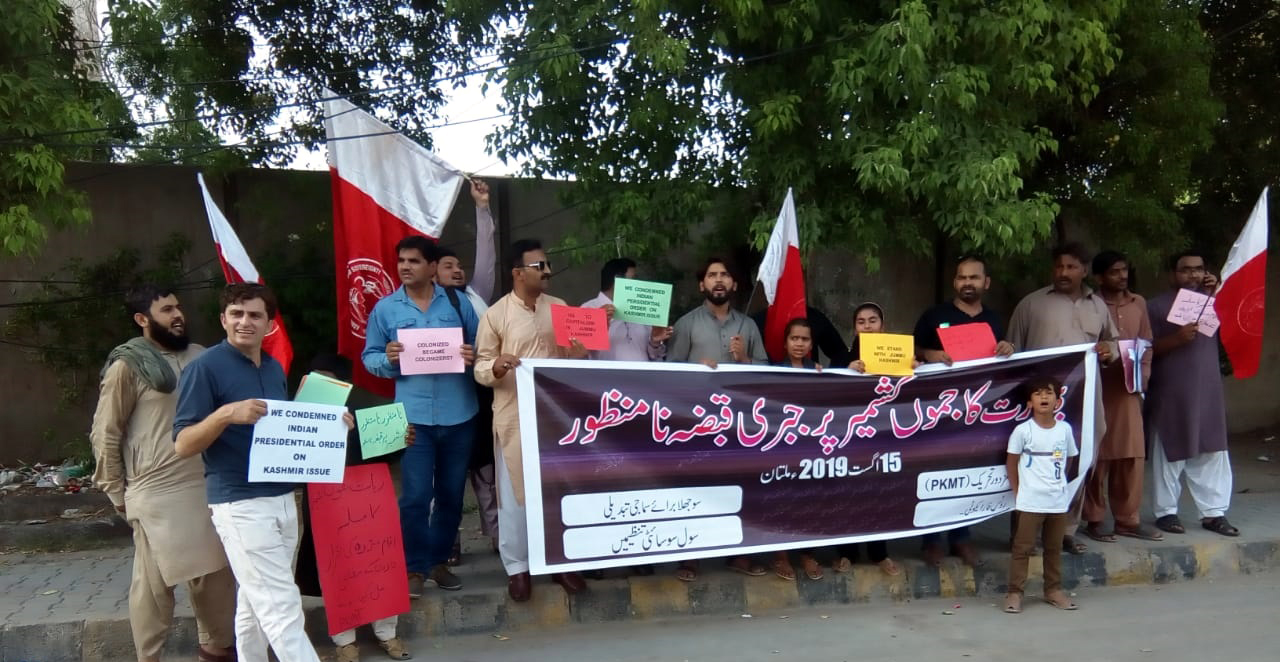
Today about eight million Kashmiris under Indian Occupation face torture, incarceration, and brutal suppression of all their political and human rights, including, very fundamentally, the right to life and liberty. Though Kashmiris have faced repression, violence amounting to crimes against humanity, watering down of their constitutional guarantees for more than 70 years, the situation has become catastrophic since August 5, 2019.
On August 5 the Government of India illegally and unconstitutionally scrapped Article 370 and Article 35A – though changes required approval of the constituent assembly of Jammu & Kashmir for any amendment whatsoever. More critically, this nullifies any legal and constitutional relationship between J&K and India, Article 370 was the only thin legality that temporarily connected J&K to India, pending UN required plebiscite. It is now explicitly an annexation of foreign territory by the Indian state.
Abrogating Article 35A, which restricted people from outside to buy property in J&K, opens the door to the violence of settlement colonies on the most militarized occupied land in the world, while repressing its people’s inalienable right of self-determination. Since August 5, 2019, on all forms of media Indian politicians and members of Indian public have been explicitly jubilant about buying land, forming task forces to do the same, and “getting” women from Kashmir..
On the ground, within the Kashmir Valley, there has been a complete lockdown on all communication including landlines, mobile and internet services, television, and radio. There is no news of more than 1300 Kashmiri activists, intellectuals, members of the civil society, and even children as young as twelve years old, who have been arrested from their homes. Reports are trickling in of deaths of newborns, delivered on the road, as women in labour were unable to reach medical facilities due to complete curfew.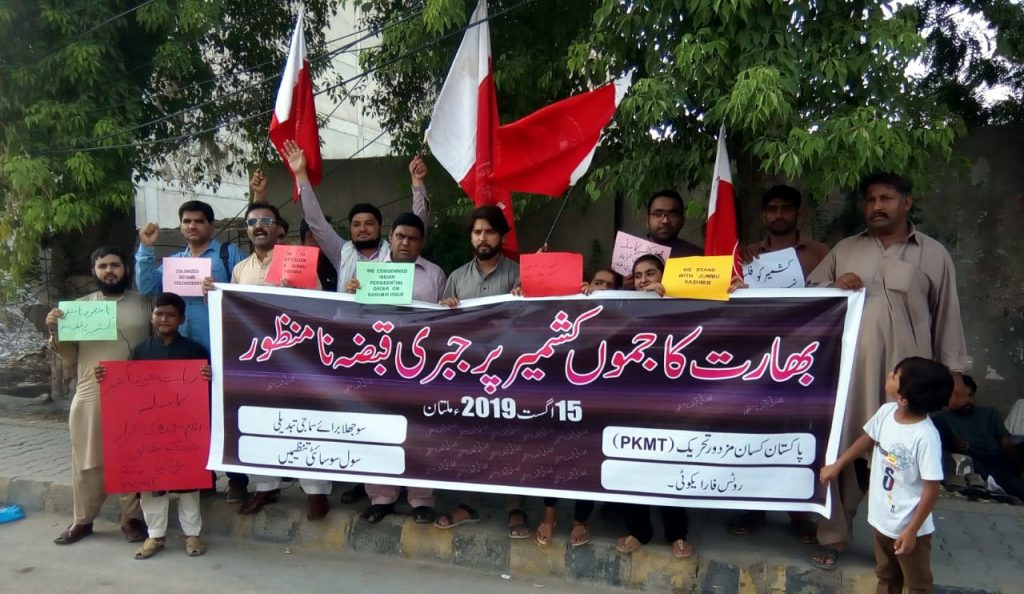
Following are the demands that are being made by people’s movements across the world against the imperialist annexation Jammu and Kashmir by the Indian state:
1) Immediately revoke the curfew and its attendant conditions and reinstate communications in and out of Kashmir;
2) Immediately and unconditionally release from detention all Kashmiris who have been arbitrarily detained or arrested under the PSA or any other colonial law;
3) Immediately and unconditionally withdraw all Indian military forces from Indian Occupied Kashmir, sending few neutral forces from the UN to maintain peace until the plebiscites.
4) MOST IMPORTANTLY implement the UN resolutions demanding plebiscites in all of Jammu & Kashmir, including CRITICALLY the right to full independence, and guarantee fundamental freedoms to all.
Released by: Pakistan Kissan Mazdoor Tehreek/ PKMT

